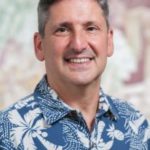
The University of Hawaiʻi (UH) is partnering with the Hawaiʻi Department of Health (DOH) to create a program to train personnel and community health workers to support DOH in conducting COVID-19 contact tracing. Health experts say extensive contact tracing, being able to track with whom those who test positive for COVID-19 have come in contact, is a key component to prevent the spread of the virus while relaxing stay-at-home-orders and restarting Hawai‘i’s economy.
DOH said on Wednesday that it had more people doing contact tracing than the department has revealed in the past, indicating they actually had over 100 contact tracers, including at least 30 volunteers from UH and other DOH divisions with backgrounds in public health, epidemiology, medicine, and nursing.
UH President David Lassner spoke at Governor David Ige’s Wednesday afternoon media briefing and said the program was developed by State Epidemiologist Dr. Sarah Park and UH’s Dr. Aimee Grace, who leads the UHealthy Hawaii Initiative.
The plan is to train approximately 300 contact tracers in two to three days, or two to three months, depending on their educational backgrounds, as well as increase the university’s capacity to prepare 100 community health workers each year. DOH can then activate the trained individuals as needed, including as emergency hires, in the event of a surge in COVID-19 cases.
The university will offer two tracks for contact tracing training: a course for clinical professionals (approximately two to three days to complete for those with at least an undergraduate degree and a clinical health background) and an intensive contact tracing program (approximately two to three months for those with undergraduate degrees, health sciences preferred). All training content and materials will be approved by the DOH.
Support will be provided to trainees that complete the appropriate program and join the DOH’s volunteer Medical Reserve Corps.
The UH Community Colleges will add capacity in the community health worker programs and update curricula so that community health worker graduates will be prepared to support COVID-19 contact tracing as needed.
Community health workers are a critical component to contract tracing with their special community-based training and ties to work effectively with identified high-risk populations. Those populations include Native Hawaiian/Pacific Islander communities, which are disproportionately affected by COVID-19, along with the unemployed and homeless.
The course for clinical professionals will be led by Kristine Qureshi, Associate Dean for Research and Global Health and emergency preparedness expert at the UH Manoa School of Nursing and Dental Hygiene. The intensive contact tracing program will be led by Ricardo Custodio, Associate Professor of Health Science at UH West Oahu.
The program is estimated to cost $2.5 million. In the media briefing, Dr. Bruce Anderson of State DOH said the department is now also using an online form for those who are close contacts to fill out, to reduce the time contact tracers need to spend on the phone.
Anyone interested in the contact tracing or community health worker training can contact: COVID19@HAWAII.EDU